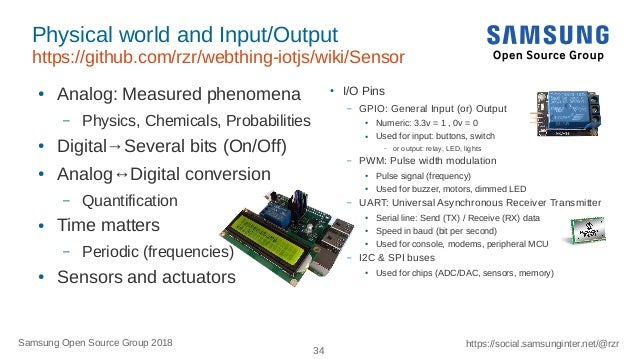GENERIC-SENSORS-LITE
INTRODUCTION:
Lightweight implementation of W3C spec, targeting constrained devices.
Several JavaScript runtimes are supported (node.js, IoT.js using JerryScript)
USAGE:
By default simulator are used and generate random values, but following sensors can be plugged on pins of your favorite single board computer:
- BH1650: for measuring illuminance (i2c=0x23)
- BMPx80: for measuring temperature, or any compatible sensor (ie: BMP180, i2c=0x77)
- TCS34725: for measuring colors (i2c=0x29)
SETUP:
Privileged access to hardware resources is also required too (setup or use sudo).
For instance on Raspbian:
sudo raspi-config # Enable I2C
ls -l /dev/i2c* || sudo reboot
sudo apt-get install i2c-tools
/usr/sbin/i2cdetect -y 1
#| 0 1 2 3 4 5 6 7 8 9 a b c d e f
#| 00: -- -- -- -- -- -- -- -- -- -- -- -- --
#| 10: -- -- -- -- -- -- -- -- -- -- -- -- -- -- -- --
#| 20: -- -- -- 23 -- -- -- -- -- 29 -- -- -- -- -- --
#| 30: -- -- -- -- -- -- -- -- -- -- -- -- -- -- -- --
#| 40: -- -- -- -- -- -- -- -- -- -- -- -- -- -- -- --
#| 50: -- -- -- -- -- -- -- -- -- -- -- -- -- -- -- --
#| 60: -- -- -- -- -- -- -- -- -- -- -- -- -- -- -- --
#| 70: -- -- -- -- -- -- -- 77
USING NODE.JS:
git clone --recursive https://github.com/rzr/generic-sensors-lite
cd generic-sensors-lite
npm install
npm start
#| node example/index.js
#| (...)
#| {"illuminance": 123.}
#| (...)
#| {"celsius": 42.}
#| (...)
(...)
USING IOT.JS
For constrained environments:
make start
#| (...)
#| iotjs example/index.js
#| (...)
#| {"illuminance": 123.}
#| (...)
#| {"celsius": 42.}
#| (...)
Note: It has been verified on GNU/Linux not TizenRT yet (TODO).
USING NODE.JS
node lib/ambientlight "{ \"controller\": \"bh1750\"}"DEMO:
An extra example is provided to show integration in Mozilla's Thing project. Sensors are powered by webthing-iotjs and monitored on dashboard as progressive web app (PWA).
Usage:
make runtime=iotjs start
make -C example/webthing runtime=iotjs start
#| (...)
log: Serving: http://localhost:8888/properties
#| (...)
curl http://localhost:8888/properties
#| { (...) "illuminance":123., "celsius":42., "color":"#c0a175" (...) } Respectively node could be supported too, just adapt to webthing-node API instead of webthing-iotjs (TODO):
make -C example/webthing runtime=node start
#| (...)RESOURCES:
- https://www.npmjs.com/package/generic-sensors-lite
- https://github.com/rzr/generic-sensors-lite
- https://medium.com/samsung-internet-dev/sensors-webthings-bc48ad9963dd#
- https://w3c.github.io/sensors/#section-mock-sensor-type
- https://developer.mozilla.org/en-US/docs/Web/API/Sensor_APIs
- https://github.com/rzr/mozilla-iot-generic-sensors-adapter
- https://s-opensource.org/2018/04/25/mozilla-iot-generic-sensors/
- https://github.com/miroRucka/bh1750/pull/17
- https://github.com/dbridges/bmp085-sensor/pull/7
- https://github.com/samsunginternet/color-sensor-js
- https://github.com/samsung/iotjs/wiki
- https://github.com/samsung/iotjs
- http://www.iotjs.net/
- http://jerryscript.net/
- https://github.com/rzr/webthing-iotjs/wiki/IotJs
- https://github.com/rzr/webthing-iotjs/wiki/Sensor
- https://social.samsunginter.net/@rzr/100969945665369600
- https://travis-ci.org/rzr/generic-sensors-lite





